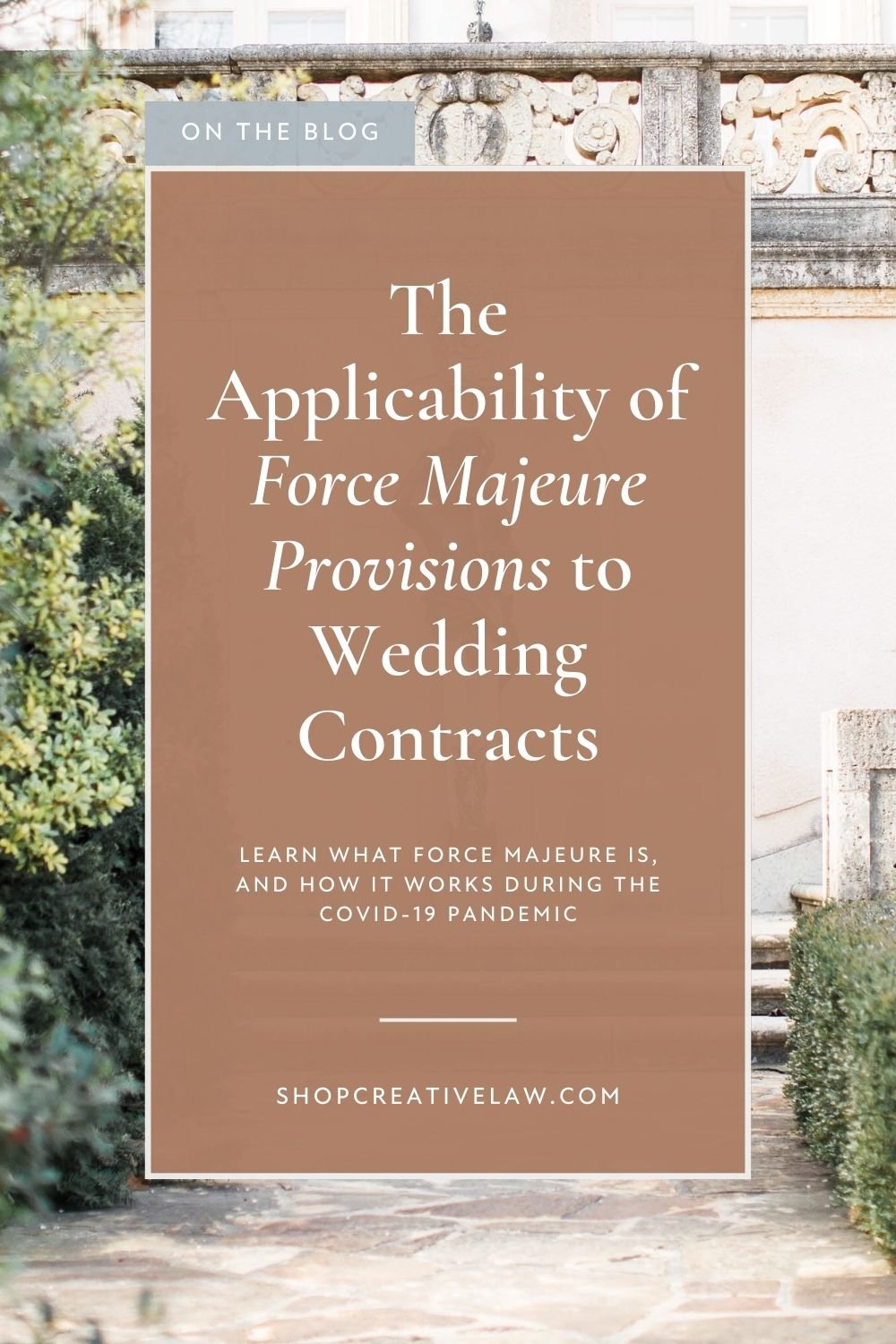The Applicability of Force Majeure Provisions to Wedding Contracts
Keep reading to learn what a force majeure is, and how it works during the COVID-19 pandemic.
In light of COVID-19 sweeping the nation and causing widespread disruption to the wedding and event industry, one of the most common discussion topics in creatives circles has revolved around that small paragraph, usually appearing at the end of your contract, that most have typically skipped over: the Force Majeure provision.
First, please do NOT continue to perpetrate misinformation in Facebook groups around the meaning of this clause. Laws around the applicability and enforceability of a force majeure provision vary greatly among jurisdictions, depend entirely upon the language in each contract, and are incredibly difficult to uphold in court. Frankly, you are doing a disservice to your industry by sharing unverified opinions about the topic.
Because laws around force majeure provisions vary greatly state-by-state, the purposes of this article are to give a general outline of what a force majeure provision is, and to provide free language you can add to future contracts now. If you do not have a local attorney you can turn to, this situation should teach you that doing so is critical. Beginning with a template is a great way to handle business legalities affordable, but that does not negate the critical need to have someone to turn to in the event of an emergency. A common misconception is that attorneys are too expensive for most creative businesses to afford. While yes, a full-scale contract drafted from scratch may take 10+ hours to draft (at an hourly rate), asking an attorney to review a contract will only take a short amount of time- and be the cost equivalent of maybe bypassing Starbucks for a month or two.
“As they relate to the wedding industry, force majeure provisions will be very hard to enforce; while nothing is impossible, this isn’t an argument it would be wise to hang your hat on.”
-Paige Hulse, Creative Law Shop® Founder
Stepping off that soapbox for a bit, let’s examine what a force majeure provision looks like, and how COVID-19 plays into this conversation. Here’s what a standard Force Majeure provision may look like:
Force Majeure. Either party may choose to be excused of any further performance obligations in the event of a disastrous occurrence outside the control of either party, such as: an act of God (fires, explosions, earthquakes, hurricanes, natural disasters, flooding, storms, or infestation), pandemic, infestation, governmental order, or War, Invasion, Act of Foreign Enemies, Embargo, or other Hostility (whether declared or not), or any hazardous situation created outside the control of either party such as a riot, disorder, nuclear leak or explosion, or act or threat of terrorism.
Generally speaking, force majeure clauses excuse a party’s nonperformance under a contract in the event of an extraordinary event that prevents a party from fulfilling its contractual obligations. As they relate to the wedding industry, force majeure provisions will be very hard to enforce; while nothing is impossible, this isn’t an argument it would be wise to hang your hat on.
First, the interpretation of a force majeure provision is contract-by-contract specific. Second, the implementation of laws (ie, foundations for the legal term of “impossibility”) varies nearly from city to city. In other words, some cities and states are under lockdown; making performance impossible, and courts will have to determine the applicability of the declaration of COVID-19 as a “pandemic” before we have clear-cut answers.
However, here is why I would not personally take on a case requiring an argument for a force majeure defense as it relates to a wedding postponement/cancellation:
Again, generally speaking (again, depending upon the interpretation of your (contract’s) jurisdiction), courts will look at a combination of factors to determine the applicability of a force majeure provision:
Does the contract specify this type of event as “force majeure”?
The amount of foreseeability of the event, and its ability to be mitigated;
And, whether or not the contract’s performance was actually impossible.
These are “and” statements, meaning all should be answered in the affirmative. In other words, your contract could specifically list “COVID-19” as a force majeure event, but if the non-performance was able to be mitigated, or was foreseeable, that defense won’t hold up.
The CDC and WHO declared COVID-19 a pandemic weeks ago (at the time of this writing). Most weddings affected by this pandemic (those from early March through May 16, if calculated based upon the CDC’s 8-week guidelines) had notice, and therefore, the risk of non-performance had the ability to be mitigated (in other words, you most likely had enough notice and the opportunity to reschedule or postpone your services, therefore, the ability to mitigate the non-performance).
This is the #1 reason why this argument (likely) won’t hold up.
The classification of COVID-19 as a “pandemic” may aid in some force majeure arguments, assuming the other hurdles may be overcome. Documenting every communication and attempt at mitigating the nonperformance of your services will be critical. To further complicate things, depending upon the jurisdiction, force majeure provisions within each contract will be treated very differently. For an example of this, this article demonstrates the differences between Florida, California, Texas, and Illinois.
If the Coronavirus can teach us anything, it is that we must take care of the “business” side of business BEFORE a crisis arises. Please, if you take anything from this article, take The Creative Law Shop®’s strong suggestion that you establish a relationship with an attorney in your jurisdiction before you do anything else.
We will always endeavor to provide you with the best legal templates we can, but templates are designed to be a starting place. Please take them to your attorney to ensure that they are compliant and as strong as possible for your jurisdiction.
Oh, and if you don’t have a force majeure provision in your contract yet, swipe that language above. COVID-19 won’t be “unforeseeable” for the near future due to the 18-month projections, but this addition to our standard language has been drafted to be as strong as possible while covering the largest scope possible at the same time.






